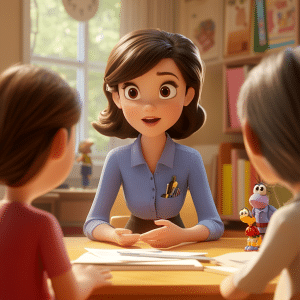Child therapy services may be of particular benefit in instances where children have been affected emotionally, have emotional problems, or have gone through a traumatic experience, where they require the healing that child therapy can offer. Since childhood trauma therapy and provision of emotional support involve working with young minds, then we are the right place to refer it to at The Center for Child Development.
Reasons why children should be given special treatment therapies
The setting of child therapy being highly different compared to that of adult counseling since in most cases, children use to enact themselves not only through words but also through the play, behavior, and nonverbal communication. Regardless of the anxiety, trauma, behavioral disorders, or developmental disorders your child is coping with, if evidence-based child therapy methods are used, he/she is likely to recover and succeed.
1. Play Therapy: The Foundation of Child Healing
What Play Therapy Treats:
- Depression during childhood
- Violent or rebellious behaviours
- Family change (change in spouse, newly born siblings, grief and loss)
- Social skills development
- Poor emotional regulations problems
- Academic stresses and difficulties at school
2. TraumaPlay™: Specialized Childhood Trauma Treatment
TraumaPlay™ represents a breakthrough in trauma-informed therapy for children. Developed by Paris Goodyear-Brown, this integrative model combines play therapy with structured trauma processing techniques specifically designed for young survivors.
Perfect for Kids that Have:
- Abuse due to physical, emotional or sexual reasons.
- Traumatic medical conditions and hospitalization
- Loss, abandonment, or neglect
- Foster care Exits, and adoption issues
- The sight of violence or accidents
- Community trauma or Natural disasters
Key TraumaPlay™ Components:
- Safety and emotional regulation building
- Gradual, child-paced trauma processing
- Attachment repair and family connection
- Resilience building and empowerment
- Support of caregivers during treatment
3. EMDR for Children: Advanced Trauma Processing
EMDR treatment in children (Eye Movement Desensitisation and Reprocessing) serves as a potent treatment method of healing a sad memory in the mind of the child. This neurobiologically-based therapy works on the concept of bilateral stimulation to allow the mind to re-process painful memories in a less painful way.
Pediatric EMDR is specifically modified to children with the usage of:
- Age specific metaphors, imagery
- Bilateral stimulation by means of play
-
English instrumentalism and art
- Child-friendly trauma processing techniques
EMDR Effectively Treats:
- The consequences on the child at the post-traumatic stress disorder (PTSD) level
- Peculiar phobia and fears
- Doctors report that panic symptoms, and anxiety disorders are what they experience.
-
Low self images and poor self values
- Medical trauma from procedures or accidents
- Attachment trauma and relational difficulties
4. Parent Support Groups: Strengthening the Healing Foundation
Parent education and support are essential components of successful child therapy outcomes. Our parent support groups provide caregivers with the tools and knowledge needed to support their child’s healing journey.
Parent Group Benefits:
- Learn about child development and trauma responses
- Practice emotional regulation techniques for home use
- Develop attachment-building strategies
- Get in touch with other families that experience the same struggles
- Have continuing support of professional child therapists
- Fortify family ties and dialogue
Such evidence-based parenting programs assist in creating a warm home environment that is going to uphold the effectiveness of the proposal of treatment and of superlong-term healing.
Indications your child may need the help of professionals
Behavioral Indicators:
- Relapse in development (bedwetting, baby talk)
- Destructive or aggression behavior
- Abandonment of family or associates or interests
- insomnia or nightmares
- Failure to attend schools or school drop-off or school deterioration
- Anxiousness or even fearfulness
Emotional Signs:
- Sadness or mood persistence or changes
- Lack of control of emotions
- Negative self talk or low self esteem
-
Trauma (symptoms flashbacks, avoidance)
- Attachment difficulties with caregivers
common Questions on Child Therapy
Q: What is the length of overall therapy of child? A: The time scale of treatment depends on the need but most children make improvement after 12-20 sittings. The trauma can take a longer time in treatment.
Q:Will my child talk about what occurred? A: Children do not have to talk about trauma out loud because child therapists utilize a playful, creative approach. Healing occurs not only through expressive and play techniques.
Put in a Next Step of Professional Child Therapy Services:
When your child is challenged by emotions, behavior and trauma, he/she can benefit greatly with professional assistance. Our holistic approach to child therapy entails play therapy, TraumaPlay and EMDR and parental support to facilitate a life-altering process of healing.
Ready to Begin Healing?
- Please schedule a consultation with our child therapy specialists
- Join our next parent support group
- Find out more about children trauma-informed care
- Learn about our well-established family therapy services
At The Center for Child Development, each child should receive evidence-based care with compassion that respects his or her individual healing.


